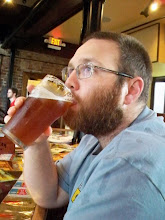The Road
Cormac McCarthy
Trade Paperback, 287 pages
I guess I've been sucked in by the Oprah hype, but I finally decided to just go ahead and read this thing. And for a book as good as this one is, I have lots of problems with it.
A lot of people questioned the inclusion of a book with child cannibalism and near-starvation into Oprah's book club, until now mainly known for picking feel-good chick-lit, but to me it makes perfect sense: the novel is fairly short, composed of simple straightforward (if very good) writing, and despite its postapocalyptic setting contains themes of hope in the face of adversity, the struggle of being a parent, and the power of basic human decency.
If you don't know the story, let me sum it up for you: in a postapocalyptic wasteland (probably after nuclear war, but it's never explicitly stated), a man and a boy (never named) seek warmer weather by walking along the eponymous road, and dodge cannibals and other unsavory characters along the way. The father (probably a doctor, given some specialized knowledge he has) is dying of some unspecified illness that makes him cough blood every morning, and both father and son are severely malnourished, often going days at a time without any food at all.
And that's basically it. I can't discuss it any further without going into spoiler territory (and the very real joys of this book require coming to it knowing as little as possible), so if you're still planning to read it leave now. Just know that I recommend the book pretty highly, with caveats.
Now that all the spoiler-averse have gone, let me discuss the ending a bit. Basically, the man dies of his illness, and the boy ends up in the care of a kind stranger and his wife, who have apparently been tracking them all this time. Why a kind stranger would simply allow the man to die, to simply allow them to nearly starve to death, to have their supplies stolen, to nearly be caught by paramilitary cannibals, is never even remotely explained. It's a happy ending (and the short description of the boy's life with the family has more in common with a Rockwell painting than the apocalyptic nightmare that make up the rest of the book) that the story doesn't earn, and that feels tacked on.
It's possible that this is part of the religious imagery of the book (and another reason Oprah picked it for her book club) -- the boy has been "redeemed" by the death of his father or some such. That the story is so clearly a parable (no character is ever named except for a blind old man wandering in the forest without any visible means of support, who goes by "Ely") helps to support this contention -- perhaps it's all supposed to be some religious allegory. But for this atheist, it really just seems like a copout.
In fact, the whole thing just seems like a bit of a copout. Despite the harshness of the wasteland described (and it's about as harsh as I've ever seen in a postnuclear novel), these characters never really seem to be in any danger to me. In any sort of reality, this small kid (thankfully not a "cute" kid, but one hardened to the world around him) and his sick father would end up being entrees in a paramilitary pot roast -- McCarthy often has them escape death more by luck than by wit or skill. At one point, they literally stumble upon a store of canned food left behind by now-dead survivalists, perhaps more evidence that the book is really some sort of religious allegory.
Overall I won't be surprised at all to see this book taught in upper-level high school classes in a few years. It has the kind of complexity that goes well in those sorts of classes, as it has a fair amount of symbolism and straightforward "themes" that make it easy to teach. And, as I mentioned above, it really is exquistely written, filled with images and dialogue that evoke the world and the characters in very real ways. That I find myself disappointed with the book speaks more to my own experience with postapolcayptic science fiction (there's little here that wasn't done forty or fifty years ago in pulp science fiction magazines and books) than with the quality of this book.
I'd be remiss if I didn't recommend a book I enjoyed more that touched on some of the same things. David Brin's The Postman (yes, the one on which the movie was based, but don't hold that against it) may not be quite as bleak as McCarthy's work, but it is much more concrete in detailing the kind of society that might survive a nuclear war, and the way it deals with the responsibilities of government and warfare regularly inform my own political views. Instead of ending with a deus-ex-machina, it earns the sense of hope for the future that informs its final chapter. All that and some great action scenes, too.
Monday, April 16, 2007
Subscribe to:
Post Comments (Atom)

No comments:
Post a Comment